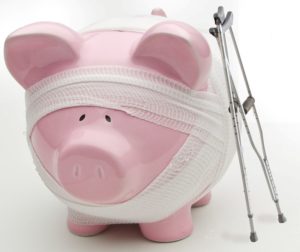
Picture this. You’re an established cardiologist practicing in the city of your dreams. You have the car, the house, the second car, the country club membership, and a few luxury items in your wardrobe. Life is good. But it throws you a curveball, as it has the tendency to. You injure yourself while skiing in Aspen, and after a few painful operations, have to complete an intense rehabilitation program before returning to work. Can you afford to take a month off? How about two weeks?
A recent survey found that 69% of Americans have less than $1000 in savings, and one in three have $0 saved for retirement. I know what you may be thinking – these data primarily represent lower-income households. True. But that same survey found that 23% of respondents making greater than $150,000 had less than $1000 in emergency funds (6% had nothing set aside). A 2015 Nielsen study found that 25% of Americans earning more than $150,000 per year lived paycheck to paycheck. Couple that with this story of a physician-physician couple with a household income of $750,000 but a net worth of $0. This is the plight of many high earning but not rich yet Americans (or HENRYs as they’re referred to in financial circles).
How can you prevent yourself from becoming a perpetual HENRY? How can you break the Work = Income redundancy? If you’re reading this, it’s now. And it begins with changing your mindset towards money/finances. We, as physicians weren’t exposed to much of the finance world as we spent our income-free 20s buried in textbooks and Prometric centers. In fact, many of us resent money, we ignore money and whenever someone talks too much about money it makes us cringe (re: contract negotiations). Then, we received a few short years of lower-middle-class income before being thrust into the top 1% of earners. Like a first-round draft pick, we rush to the local dealerships and realtors with our big smiles and our big checks ready to make up for the lost time.
This is precisely the moment, in the first three to five years of being an attending, that we set our financial trajectory. Here are a few tips that I’ve gathered from people much smarter than I to hopefully help you set your trajectory high.
- Don’t fall for bad advice
Most physicians don’t know much about personal finance, and an advisor is a great idea if that’s your situation. However, choose your advisor like you to choose your barber. Don’t just jump at the first offer. Do your research, ask your attendings, ask financially responsible friends/family. And don’t be afraid to do it yourself! Here are a few sources to check out: WhiteCoatInvestor podcast, Valuetainment on youtube, RyanScribner on youtube
- Live like a resident initially
It’s easier said than done but hold off on buying that house or that car for the first few months or years. This allows you to pay off debt, improve your credit, save/invest and settle into your new income. If you have student loans, it also allows you to refinance them and determine what your new payment structure will be. Some rules of thumb for early spending: do not spend more than 15-20% of your annual income on a car, 20% goes to savings & investments, set up an emergency fund 2-5%, give to charity (variable). Check out this Charles Schwab survey on why people live paycheck to paycheck; the responses might surprise you.
- Retirement is closer than you think
It’s not too early to start planning for retirement. Many physicians work well into their 70s and 80s due to the reliance on an income to maintain their lifestyle. Do a simple calculation now. How much per year of income would you need to live comfortably? Multiply that by 25. That is the amount of money you need to have for retirement by age 65. Check out this tale of two doctors for more.
It’s important for physicians to tend to our financial fitness as we tend to our physical fitness. Just like everything in life, practice makes perfect. Try saving 20% of your resident/fellow salary this month. Practice trading stocks using a simulator like Investopedia’s. If you’re going to be an attending in July 2020, plan out how the rest of the year looks for you financially, so it won’t be such a surprise when you get there. I hope this post was informative and even a little entertaining. Please look out for more on this topic in the future.
Back to your regularly scheduled programming…
The views, opinions and positions expressed within this blog are those of the author(s) alone and do not represent those of the American Heart Association. The accuracy, completeness and validity of any statements made within this article are not guaranteed. We accept no liability for any errors, omissions or representations. The copyright of this content belongs to the author and any liability with regards to infringement of intellectual property rights remains with them. The Early Career Voice blog is not intended to provide medical advice or treatment. Only your healthcare provider can provide that. The American Heart Association recommends that you consult your healthcare provider regarding your personal health matters. If you think you are having a heart attack, stroke or another emergency, please call 911 immediately.
References (embedded links):
https://www.fa-mag.com/news/nielsen–even-many-high-earners-live-paycheck-to-paycheck-22704.html
https://drcorysfawcett.com/success-is-not-measured-by-income/